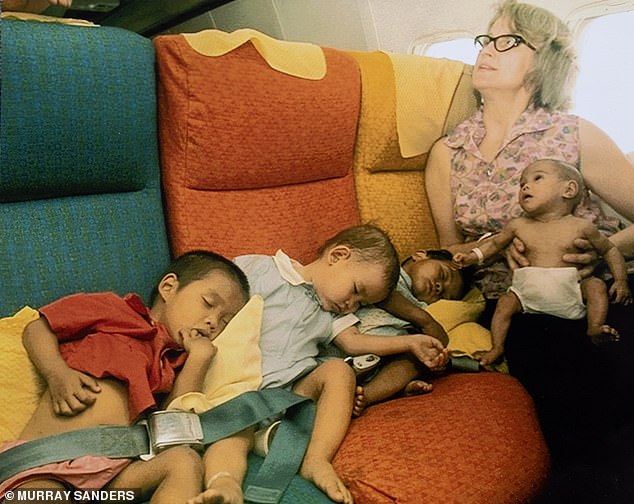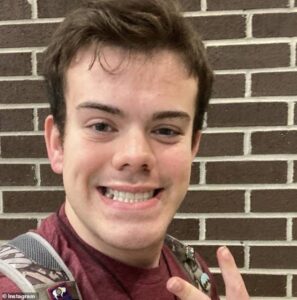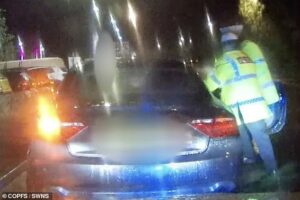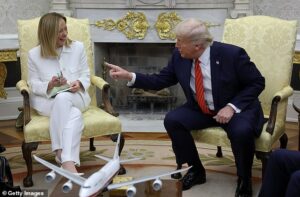By ROBERT HARDMAN FOR THE DAILY MAIL
Published: | Updated:
They were the most innocent, most vulnerable victims of a conflict every bit as savage as the Second World War – but lasted three times longer.
With no families and precious little food, with the bombings and street-battles drawing closer by the day, they had run out of hope, too. Not that most of them had the faintest idea of what was going on. The majority were toddlers and babies. Many were disabled.
That was the situation, half a century ago, at places like the Lam Thi Ny orphanage in the city of Saigon, the capital of South Vietnam, as the US-backed government was about to fall to the communist dictator of North Vietnam, Ho Chi Minh.
At which point, a lifeline – in every sense of the word – appeared from the sky 50 years ago this week. It was an airliner with the clearance to scoop up as many of these terrified young children as it could accommodate and fly them to safety and a new life in Britain.
With the enemy already at the outskirts of the city, Flight BD-757 would rescue 100 Vietnamese orphans in a complicated and audacious operation.
However, this extraordinary story does not enjoy an instant fairytale happy ending. For, 50 years later, many of those same children, now in middle age, are still asking questions: Why were they in an orphanage in the first place? What happened to their families? What would have happened if they had never left Vietnam?
For some, a new life in Britain was not without severe hardships and challenges. None had any say in their own destiny. But, talking to a cross-section of them as they look back on the anniversary, not one regrets being carried aboard that aircraft on April 6, 1975.
These evacuees all voice gratitude to Britain for giving them sanctuary; to the charities and aid workers who helped them escape; and also to the driving force behind the airlift codenamed ‘Operation Mercy’ – the Daily Mail.


For it was a small team from this newspaper, including the editor, who took the Boeing 707 – plus a medical team – into Saigon and then brought it home again carrying precious cargo, whose plight would touch the whole nation.
So, there are very mixed emotions as all involved reflect on what happened. Some have chosen to return to Vietnam for the anniversary. Others prefer to keep their thoughts to themselves. Is it a moment for celebration or a commemoration? The Mail remains proud of the part it played at an urgent and desperate moment in post-war history but it is for those at the heart of this story to put it in perspective.
‘Touchdown at Midnight’ declared our front page the following morning, with a photo of a tiny boy being held in the arms of a nurse. That is thought to be Vance McElhinney, who went on to be adopted by a couple in County Armagh – growing up in Northern Ireland at the height of the Troubles. Below him in that famous photo we see a row of toddlers fast asleep in adjacent seats, each keeling over the shoulder of the next like falling dominoes.
In the middle, is Viktoria Cowley. For her, this week is a moment to reflect, and her long quest for answers has finally ended in contentment in Sussex where she lives with partner Paul, a journalist, and her 12-year-old son. ‘I have come to the end of my own personal search for answers about where I came from. I am happy with that. I am so grateful for the life I have had,’ she tells me over a cup of tea in Eastbourne.
‘Since having my son, I feel complete. I don’t know where I came from but I know where I am going.’
At the time of their escape from Saigon, all the children were routinely referred to as ‘orphans’ but Viktoria explains that none of them like the word.
‘We call ourselves VADs – Vietnamese adoptees,’ says Viktoria, explaining that some children still had families at the time.



She herself was raised on stories her mother had given her two youngest children to an orphanage as their best hope for survival in the face of war and ever-worsening deprivation.
Others were handed over to orphanages because they were disabled or because they were the product of affairs between Vietnamese women and US troops, thus, in grave danger of retribution at the hands of the Viet Cong. Children like Suzanne Thi Hien Hook, whose father was a black GI, became easy targets in a rigorously monocultural society like Vietnam.
In her thirties Viktoria embarked on a relentless quest for her own identity while also tracking down the other children on Flight BD-757 and organising reunions.
At one point, she even appeared on a Vietnamese equivalent of Surprise, Surprise!, a TV show which specialised in springing unknown relatives on studio guests.
That was a turning point. ‘I suddenly found myself sitting there and thinking: ‘Actually, I want to leave. I hope they don’t surprise me with a new Mum because I’ve got one I love at home.’ Viktoria was adopted by Douglas and Jennifer Cowley before she got on the Mail’s ‘Operation Mercy’ aircraft. It was Jennifer who chose the name ‘Viktoria’ with its unusual spelling – ‘she wanted me to feel I was special’.
Douglas, a naval veteran, was working in Saigon for British American Tobacco. The couple had a son but, having tried unsuccessfully for another child, were desperate for a daughter to complete their family and so decided to adopt. Viktoria proudly shows me the photos of Douglas coming to check on her in the orphanage, with the family dog, Tinker, while he was working on getting all the adoption papers in order.
The process was still ongoing when the Cowleys, like all British expats, were suddenly ordered out of South Vietnam. The couple had to leave their would-be daughter at the orphanage until the documents came through and a local friend could find a safe way of getting her to the UK.
As the situation deteriorated, the rules changed. Working through charities like the Surrey-based Ockenden Venture, the Daily Mail team received clearance to evacuate children without full paperwork. Viktoria’s only documentation was a vaccination certificate and a little plastic tag with her Vietnamese name, Lam Yen Hang.
She treasures these items in a special file, her only tangible links to the past, even though the tag didn’t say her real name. It was just the one given to her by the nuns at the Lam orphanage.
To this day, she has no idea of her original name or that of her birth mother.
Viktoria is the first to point out that the subject of the airlift is still a raw issue for some of the ‘class of 1975’. ‘There are some who have yet to start asking questions, often out of respect for the families who adopted them.’
Fifty years on, there is a heartbreaking poignancy about all their stories. Just seven years ago, Vance tracked down his biological mother (a discovery backed up by a DNA test) and was able to hear the reason he had been abandoned in an orphanage.
Boyan’s story
With a father who was a black GI, Boyan Boroco was considered one of the lowest of the low in Vietnam. He has never been able to trace his parents since no records had survived.
‘In the early days I wanted to find out more about them. But I gave up after a while. I found it was best to let it be and accept I was who I was and look to the future and not the past.’
Boyan, whose Vietnamese name was Doung Thanh Anh, was adopted into a family of ten in an arrangement made before he left the orphanage in Bien Hoa, on the Dong Nai River, northeast of Saigon.
In 1975 he was aged around seven, and one of four older boys – Hoang, Minh and Duy Lam – who were at first looked after at Keffolds, the children’s home run by Ockenden, in Haslemere, in Surrey.
David Tolfree, one of the volunteers there who was on the flight from Saigon remembers him. He said: ‘I was a mentor for this little group. Looking after the boys was a fascinating task.
‘The boys were pretty unhinged by the flight and the massive cultural change they experienced and displayed some challenging behaviours. We were not surprised to find some muddy footprints on the toilet seat which were a complete novelty to them.
Boyan, who is now thought to be about 58, said he does not have many memories of David. ‘I was so young and I don’t have many clear memories but I do recall he was kind.’
He was reluctant to leave and his adoption did not work out leaving him abandoned again in a UK children’s home. He was given the name Boyan, literally Boy Anh (his surname), so as not confuse the pupils he went to school with.
From school he joined the British Army, serving for four years, mainly in Germany but also Canada, Belgium and Norway, as an armoured personnel carrier driver with the Staffordshire Regiment.
Since then he’s had roles driving for delivery firms and now as a volunteer for special needs children.
Boyan said: ‘Like a lot of those Vietnamese babies and children on that flight we owe our lives to being given another, better chance. I want to pay this country back to say Thank you for what it has given me.
‘I consider myself to be British. I am very patriotic probably as a result of being in the Army. It was tough at times and there was a lot of bullying in the mid 1980s. I got through it though.’
Boyan has been married for coming up to 18 years to his wife Phuc, who he first met on one of his return visits to Vietnam in 2002. The couple have two children, a son, Kauai, 16, and a daughter, Angela, 14.
‘I’m very happy, grateful and settled now,’ he said. ‘I didn’t even realise it was the 50th anniversary! Where does the time go?’
His father, a Vietnamese soldier, was a drunk who had badly beaten up Vance’s mother, shot her parents and her brother and then disappeared, never to be seen again.
While his mother was in hospital, her remaining family thought it best to put the baby into the care of nuns until she recovered so, they took Vance to the orphanage without telling her.
By the time his mother was better, the child was starting a new life on the other side of the world, no longer Nguyen Van Tan but christened Vance McElhinney.
Yet, there is no bitterness half a century later. ‘Vietnam was a war zone. And in war normal rules don’t apply. I am actually grateful to the Daily Mail for flying me out because if it wasn’t for the paper I wouldn’t be where I am now,’ says Vance, now the proud father of Liz, his daughter with his Vietnamese wife, Le. The child is named after Vance’s adopted mother. ‘The McElhinneys did everything for me. I could not have wanted for a better family. I have no resentment,’ says Vance. ‘And my mother, difficult though it was for her, believes I have had a better life.’
The same could not be said for all, as some ‘VADs’ couldn’t fit in with their adoptive families. Most came across some sort of racism. Viktoria experienced it at her Sussex secondary school following an excruciating history lesson on the Vietnam War. Since childhood, she has also been unable to watch anything about the Vietnam War. ‘I just switch them off,’ she says.
‘I don’t want to know.’ Some of the VADs regularly return to Vietnam. Suzanne actually moved back to set up her own orphanage. Others, though, have spoken of not ‘belonging’ anywhere, and on returning to Vietnam have been treated like tourists or foreigners.
Back at the start of 1975, the Vietnam war was in its twentieth year, a horrible proxy war between communist and Western superpowers with well-documented atrocities against civilians on both sides. America had finally withdrawn from the conflict following international peace accords but, in the spring of 1975, these were torn up by Ho Chi Minh, whose troops swept down from the North in a matter of weeks.
Stung by the pace of events, US President Gerald Ford issued an order to evacuate more than 100,000 South Vietnamese who had worked with US forces, including 3,000 orphans. The US called it ‘Operation Babylift’.
Britain had refused to be drawn into the war in Vietnam, despite strong pressure from the US. However, the British public were as sympathetic as everyone else to the plight of these tiny, blameless victims of the conflict.
At which point the editor of the Daily Mail, David English, took action. He instructed his foreign editor, Brian Freemantle, to assemble a team and head to Saigon while a civilian airliner was chartered from British Midland to rescue as many children as possible. As they have always done, the readers of this newspaper were generous with their donations.
This was an operation fraught with danger. Just the previous day, an American airlift bound for the US crashed, killing 178 of the 313 on board. The cause remains a mystery, though many suspect sabotage by the Viet Cong.
Undeterred, David English and his team knew time was of the essence and he was there on the runway the following day to help carry these tiny passengers up the steps. Many were already sick with disease and malnutrition, some critically so. Once back in the UK, the children were taken to the Surrey home of the children’s charity, Ockenden Venture for further checks and adoption.
The anniversary is unusual in that nearly all the children involved have no recollection of what happened, while those who organised it are no longer with us.
However, one man who remembers it all, is retired charity worker and academic, David Tolfree. He had joined the Ockenden Venture six months earlier, was in close contact with the British Embassy and with Saigon on the brink, he received a personal missive from London. It was from the foreign secretary James Callaghan, informing him he was welcome to bring back as many children as he could – with or without documentation.
Having learned the Mail was arriving with a plane, he and other charities got their charges to the airport. As they waited for their coaches, other children appeared from nowhere – some as old as ten. ‘I didn’t know them but what could I say?’ he tells me from his home in the Isle of Wight. ‘So they came too.’
‘Today, I find I have two contradictory reflections. On the one hand, my general feeling is taking children who don’t have a family to another country is not the best strategy for helping them. But there are circumstances when it is the only option. What would have happened to those left behind?’
Over the years, the Mail has come in for flak from other media groups for having the temerity to do what it did. The paper endured similar barbs during the Covid pandemic when we chartered an airliner to fly £1million of PPE equipment into Britain.
Once again, our readers rallied behind our MailForce charity and we chartered planeloads, making it the most successful campaign in Fleet Street history. One BBC journalist even tried (unsuccessfully) to link our PPE with Chinese slave labour. We were not deflected, just as David English and Brian Freemantle had no qualms in 1975.
When Freemantle died last year, Viktoria went to his funeral. ‘I always stayed in touch and would see him and his family every year,’ she says. When her son was born in 2012, she thought of Brian Harry Freemantle and his colleagues and what they achieved against all odds in 1975. So, she named her son Harry.
- Additional reporting: Simon Trump








